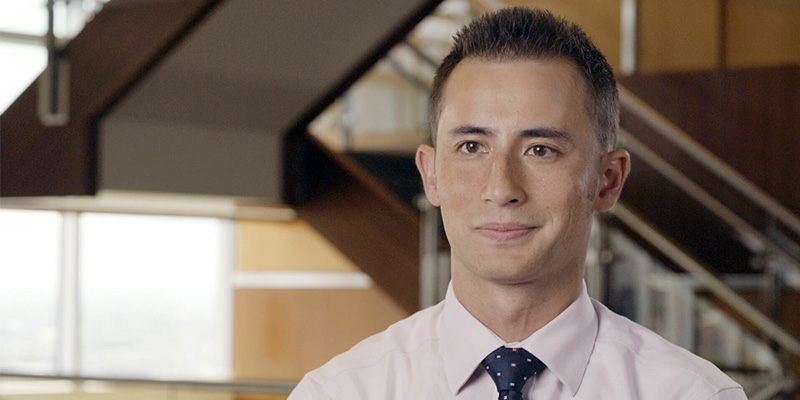WCF Insurance Proves that Doing the Right Thing is Good for Business
For more than 100 years, WCF Insurance has been protecting both workers and employers as Utah’s premier workers’ compensation insurance provider. Although the company has come a long way from its beginnings in 1917, its dedication to creating strong communities has remained constant. With this dedication in mind, WCF Insurance set out to develop a program to prevent opioid misuse and addiction among injured workers and bring significant, positive impact on their local communities.
Opioid Abuse: A National Problem with a Community Impact
Paola Stauffer, VP Claims Operations at WCF Insurance
According to the NIH, roughly 21 to 29 percent of patients prescribed opioids for chronic pain misuse them. Like many states across the U.S., in Utah, addiction to prescription painkillers has reached epidemic proportions. In recent years, the state has witnessed a 400 percent increase in opioid deaths—equivalent to 23 people dying from prescription drug overdoses every month. In addition to the staggering statistics, employees at WCF were witnessing the effects of opioid abuse first hand. Community members, including their friends and family, were going down paths that they never intended, unable to function on high doses of medication, detaching from their spouses, children and the world around them. Something had to be done to curb the misuse of and addiction to opioids with its widespread effects including the spread of infectious diseases, increased overdoses, and higher incidence of neonatal abstinence syndrome due to opioid use and misuse during pregnancy.
Committed to Doing More
WCF recognized that injured workers who were receiving opioids early and often after an injury also had claims that stayed open longer with poorer outcomes relative to returning to work—no surprise since restoring function and quality of life becomes much more complicated when there is an added layer of chronic opioid use.
It’s not about saving money, it’s about saving lives.
Guided by their commitment to protecting workers, employers, and the community from the dangers of these medications, including the impact on return to work, loss of family support, addiction and death, adjusters at WCF sounded the alarm when they saw a rise in the number of opioids prescribed to injured workers for acute but non-severe pain. As a non-formulary state, Utah does not mandate specific drug protocols to prescribers, and there is little legislative opportunity to help drive change. As the largest workers’ compensation insurer in Utah, WCF realized it had to do more to tackle the growing opioid crisis to ensure injured workers could safely return to work despite the lack of legislative support.
Reducing Opportunities for Addiction and Abuse
The claims operations team, led by Paola Stauffer, Vice President of Claims Operations at WCF, championed the effort to address the opioid crisis through their Pharmacy Partnership Program. By focusing on appropriate opioid use initiatives (getting the right medication to the right people for the right situation), there is less opportunity for individuals to begin a path to tolerance, addiction, or abuse. With that in mind, their first goal was to reduce the unintended consequence of using an opioid when alternative non-opioid therapy is appropriate. Their secondary goal was to ensure that when an opioid is medically reasonable, the quantity and dose are in alignment with current evidence-based treatment guidelines: the lowest effective dose, for the shortest period needed, when treating acute pain. Because after just five days of prescription opioid use, the likelihood of long-term dependence on these drugs rises steeply, they wanted to avoid inappropriate escalation or continuance when not medically indicated.

Our goal isn’t to deny medication. We don’t want opiates sitting on people’s shelves because we care about the community and we care about our injured workers.
Most importantly, WCF was committed to not only saving the lives of those they work with directly but also to saving the lives of members of the community who would benefit from WCF stepping up to initiate change. “It’s not about saving money, it’s about saving lives,” said Stauffer. WCF insurance adjuster Kelley Thurman adds that the objective is not to deny medication; it’s to open a dialogue with claimants, policy holders and employers about how to manage pain differently. “We don’t want opiates sitting on people’s shelves because we care about the community and we care about our injured workers.”
WCF Changes the Odds with a Multi-Pronged Approach

How does an organization have an effect on a nationwide epidemic in an environment where it could not make an impact legislatively? Initially, WCF’s journey started as a process improvement project to deliver better outcomes for workers by ensuring a quicker return to work. Debra Mayo, Manager of Utilization Review noted, “we soon learned that the problem was more significant than anticipated and required a multi-pronged approach.” WCF Insurance Physician Reviewer Dr. Andy Phillips, MD continued, “Getting physicians and other providers to buy into the program has been key to helping the program succeed.” WCF researched the available solutions in the market that could achieve the initiative’s goals. For acute injuries, it selected and launched a program that applies utilization-review protocols to manage all first, second and third-fill opioids. For people contending with chronic opioid use, it chose an oversight tool to help identify potentially life-threatening prescription regimens quickly. In addition, WCF implemented tactics to ensure successful adoption. Education and communication were key to WCF’s approach:
- Pre-launch, the proposed protocol was reviewed with stakeholders who would be impacted by the program, including physicians and the labor commission.
- Symposiums were held with employers to educate on the dangers of not knowing if employees come to work impaired.
- Utilization review nurses provided education to the providers.
- Flyers were sent to providers announcing the program.
- An on-staff physician was available to answer questions from provider MDs.
- Triggers initiated immediate reviews between the adjustor, injured worker and attending physician opening a dialogue to ensure appropriate treatment.

WCF experienced a 51% decrease in total quantity of opioid pills dispensed, which is the implied equivalent of a 41,000 opioid pill reduction from the prior year. That’s 41,000 fewer opportunities for individuals to begin an unintended path to tolerance or addiction.
What an Impact a Year Has Had
At the start of this journey, WCF knew that someone had to step up and “turn the Titanic” as Stauffer says, safely away from the present and future risks to the community. What an impact a year has had. WCF’s proactive program and community education to prescribers have dramatically decreased the number of pills dispensed and potentially spared injured workers from the impact of addiction. The passion, hard work, and steadfast dedication Stauffer and her team devoted to this initiative paid off. The combination of management of first fills and increased awareness of dangerous chronic use resulted in an 11 percent decrease in claimants using opioids, a 12 percent decrease in average fills per script and a 29 percent decrease in total opioids dispensed. Moreover, WCF experienced a 51 percent decrease in the total quantity of opioid pills dispensed—the implied equivalent of a 41,000 opioid pill reduction from the prior year! Fewer opioids in the community at large should have a positive impact on saving lives from the long-term effects caused by unauthorized access, opioid addiction and dependency.

Since the introduction of the opioid protocol, we have better guidelines and a better understanding of what’s appropriate. It gives us the tools to educate providers and injured workers.
As the front line of defense tackling misuse and addiction every day, WCF adjustors like Jodee Borton also witness the advantages of this initiative. “Since the introduction of the opioid protocol, we have better guidelines and a better understanding of what’s appropriate. It allows us to better educate providers and injured workers.” WCF theorized that the ancillary benefit of its program would also have a positive impact on opioid prescriptions for non-WCF injured workers. Mitchell data seems to supports this. Since the roll out on March 1, 2017, WCF programs have had an influence on the prescribing practices of physicians as well as a broader community of health partners who have followed WCF’s lead and established similar reduction goals. Mitchell’s Pharmacy Solutions data reflects a 67 percent decrease in opioid scripts filled in Utah for non-WCF claims from the first quarter of 2016 through the first quarter of 2018. After the introduction of the RightRx program, opioid fills saw the steepest decline by almost 50 percent.
The first time I saw the billboard I brokedown in tears. Knowing that all of our hard work had come to fruition and that we really are keeping workers safe.

Upon the success of this first of its kind initiative, WCF put up a billboard along a heavily trafficked corridor to send a clear message that if the community comes together, the impact on the crisis will be even more substantial. “The first time I saw it I broke down in tears,” says Stauffer, “knowing that all of our hard work had come to fruition and that we really are keeping workers safe.”
WCF is All-In
WCF anticipates that its efforts will be part of an overall reduction in the opioid-related death statistics for Utah. In the future, this program and its success will be rolled out to other states, and that includes communicating initiatives outside of the WCF organization to the wider community. As the face of the opioid change at WCF, Stauffer was invited to sit on a committee that will be participating in an initiative to propose legislation to help combat the opioid epidemic state-wide. “It’s so enlightening and such a wonderful opportunity to take like-minded people including physicians, carriers and pharmacy managers who recognize that we all need to get on board because can’t do this by ourselves,” says Stauffer. WCF is fully committed to doing its part to combat the opioid epidemic by continuing to invest in programs, education and community-wide outreach to save more lives from addiction or overdose. WCF is all-in.


